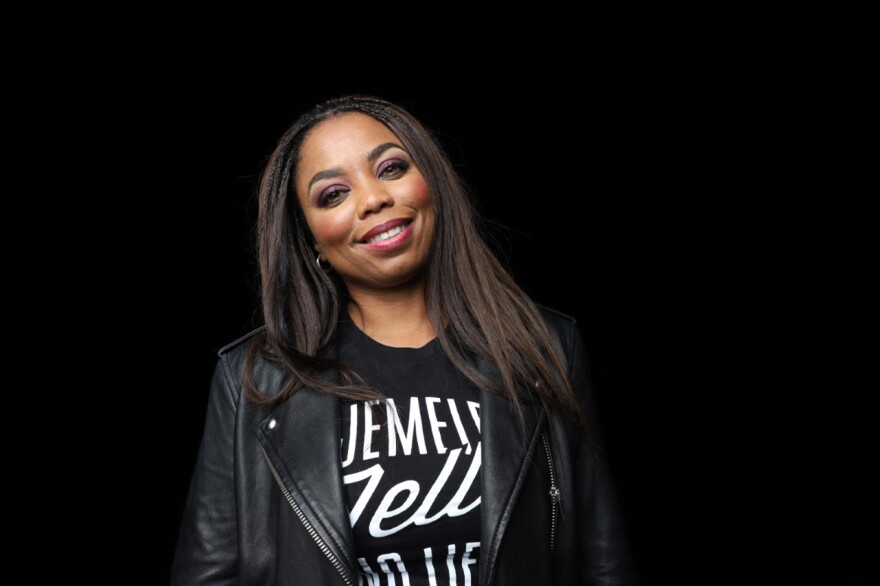Jemele Hill knows a lot about being a trailblazer. Now, the host of the podcast "Jemele Hill is Unbothered," Hill early in her career had the distinction of being the only Black woman working as a sports columnist in all of North America. Her work for outlets like ESPN helped carve out space for women journalists in the (largely white) male-dominated field of sports.
Hill was the keynote speaker for Friday’s Martin Luther King Jr. Cultural Dinner at Illinois State University. Just hours before her address, Hill watched as President Joe Biden announced his nomination for the Supreme Court. If confirmed, Ketanji Brown Jackson will be the first Black woman to serve on the nation’s highest court.
“Looking at the visual, it was very arresting to see President Biden flanked by two powerful Black women,” said Hill, referring to Brown Jackson and Vice President Kamala Harris. Hill said the sight of the two women on stage was something she never expected to see in her lifetime. Even so, she said, it was long overdue.
“It’s safe to say that it’s far past time when you look at the history of the Supreme Court,” Hill said.
As momentous as the nomination of Brown Jackson is, it’s still difficult not to wonder how it took so long to get here. The Supreme Court has been in existence for 232 years. And yet this nomination represents the first time that Black women and girls in America will see someone on the bench who looks like them.
While the appointment of Brown Jackson will certainly represent progress, many people caution it is not an indication that the country is where it needs to be on matters of equity and inclusion.

In a recent article she wrote for The Atlantic, Hill argues it’s far too easy to become placated by the appearances of equity. She points to the recent example of former NFL head coach Brian Flores and the league’s Rooney Rule.
The Rooney Rule was instituted in 2003 in response to the threat of a class-action lawsuit against the NFL for discriminatory hiring practices. The rule stipulates that minority candidates must be interviewed for all head coaching and senior operation positions. But the rule stops short of implementing any quotas for minority hires, resulting in significant under-representation in a league where more than 70% of players are Black.
In the case of Flores, he was led to believe he was being seriously considered for a head coaching job with the New York Giants. Flores learned through a texting gaffe with Patriots coach Bill Belichik that the job had been quietly given to a white coach before Flores even had the chance to interview. Presumably, had Flores not been accidentally tipped off, the Giants would’ve gone ahead with his interview solely to satisfy a rule that required them to do so.
Writing in The Atlantic, Hill said Flores’ case illustrates the Rooney Rule as “a charade of inclusion.” Like so many gestures toward equity, it has failed to produce anything approaching meaningful change.
Hill’s criticism of the NFL’s Rooney Rule echoes a point raised by Normal resident Chris Belt during a recent WGLT roundtable discussion. In a follow-up to the Living Black in Bloomington-Normal series, Belt said he was disappointed to see momentum following the murder of George Floyd dissipate into largely meaningless acts.
“You know, it’s good, I guess, that Aunt Jemima’s not on shelves, but what are the policy changes that are in place that are protecting people? Or making society feel more equitable? Or just creating a sense of belonging and fairness?” Belt asked.
Belt said a meaningful change to come out of the national reckoning on race would’ve been an end to the practice of “no-knock warrants” that led to the death of Breonna Taylor. Instead, a similar warrant executed in Minneapolis just weeks ago resulted in the death of another Black American, Amir Locke.
Hill said the NFL has demonstrated just how resistant institutions can be to truly dismantling the structures that maintain inequity and discrimination while making a show of promoting equality.
“You can't have 'End Racism' painted in your end zone when you have the situation that you have not just with coaches, but with front office personnel, and never having had a Black majority owner,” said Hill, referring to the NFL’s recent social justice promotion.
“And, by the way,” she added, “You know, blackballing a player for just being outspoken.”
Hill was referring, of course, to Colin Kaepernick, the former NFL quarterback who has been effectively banned from the league for his practice of kneeling during the national anthem more than five years ago.
“It’s very easy to take Aunt Jemima of the label of syrup,” Hill said. Far more difficult is removing the label of “historic” to occasions of Black people rising to positions of power.


